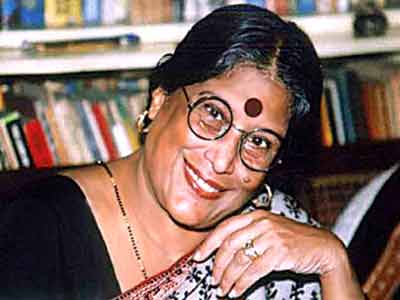 Nabaneeta Dev Sen was born in Kolkata. Her parents were also poets Narendra Dev and Radharani Devi. After obtaining Master degree she was married to Amartya Sen. However after her divorce in 1976 she went abroad for higher studies. She graduated from Presidency College and did her Masters degree from Jadavpur University, Calcutta. She has also done Masters from Harvard University. She completed her Ph.D from Indiana University.
Nabaneeta Dev Sen was born in Kolkata. Her parents were also poets Narendra Dev and Radharani Devi. After obtaining Master degree she was married to Amartya Sen. However after her divorce in 1976 she went abroad for higher studies. She graduated from Presidency College and did her Masters degree from Jadavpur University, Calcutta. She has also done Masters from Harvard University. She completed her Ph.D from Indiana University.
Literary Career of Nabaneeta Sen
She has been a writer at several international Artists` Colonies, including Yaddo and MacDowell Colony in the United States; Bellaggio in Italy; and the Mishkenot Sha`ananim in Jerusalem. She has also been a visiting professor and a visiting creative writer at many universities in the United States. She has served the Indian National Comparative Literature Association as its Vice President. She has also been the chief editor of Bengali in the Macmillan`s Modern Indian Novel Series. She is the vice president of the Bangiya Sahitya Parishat. West Bengal Women Writers` Association was her creation.
Dev Sen was nominated as the JP Naik Distinguished Fellow at the Centre of Women`s Development Studies, New Delhi, 2003-2005, where she is translating Chandrabati`s 16th century Bengali Ramayana text into English with a critical introduction and annotations.
She has received Gouridevi Memorial Award, Mahadevi Verma Award (1992), Bharatiya Bhasha Parishad Award, Harmony Award, Padmashri (2000), Celli Award from Rockefeller Foundation (1993), Sarat Award from Bhagalpur University (1994), Prasad Puraskar and Sahitya Akademi Award (1999).
Above 80 books composed by her have been published in Bengali. Pratham Pratyay was her first collection of poems that was published in 1959. She deals with social, political, psychological problems like the role of the intellectuals in the Naxalite movement, second generation NRIs, breakdown of the joint family, homosexuality, child abuse, immigration and exile in her novels. It has also been noted that women has been the central characters.
Her Bengali Publications:
Jara Hatke ebong Ananya.
Baranda.
Ghulghuli
Buddhi Bechara Saodagar
Thikana
Icchamati
Deshantar
Palashpurer Picnic
Galpasamagra
Bamabodhmi
Naba NeeNirbachita Rachana Sankalan
Sabda pare tapur tupur
Bhalobasa kare koy
Khagenababura prthibi ebong anyanya
Sita Theke Shuru
Medea Ebang
Sheet sahasika hemantaloka
Nabanita Debsener sreshtha kabita
Tin Bhubaner Parey
Swabhumi
Nati Nabaneeta
Truck-Bahoney MacMahoney
Monsieur Hulor Holiday
Ami Anupama
Isvarera pratidvandvi ebong anyanya prabandha.
Karuna Tomar Kon Path Diye(Travelogue).
English Publications
Counterpoints: Essays in Comparative Literature
The stream within: short stories by contemporary Bengali women.
Faces of the feminine in ancient, medieval, and modern India
New visions of creation: feminist innovations in literary theory
India, a wealth of diversity
Writing Style of Nabaneeta Dev Sen
Her short stories and travelogues are a rare combination of humour, human concern and high intellect. Monsieur Hulor Holiday (1980) was her first short story collection. Her travelogues like Karuna tomar kon path diye and Truckbaahane Myakmahane are classics of Bengali literature. Her other notable works include Bama-bodhini; Nati Nabanita; Srestha kabita and Sita theke suru. She is considered as children`s author in Bengali as she writes fairy tales and adventure stories with girls being the main character. She has also composed one-act plays. She is known for her humorous fiction and travel narratives. She has explored various aspects of a woman`s individuality through her fiction. She focuses on elderly as well as the girl child or the single mothers in a subtle manner by changing the way readers look at common situations. Her compositions are strongly political and it accuses society thereby building awareness about inequalities, injustices and trying to change cultural values. She has written about taboo subjects in Bengali literature without any sensationalism.













